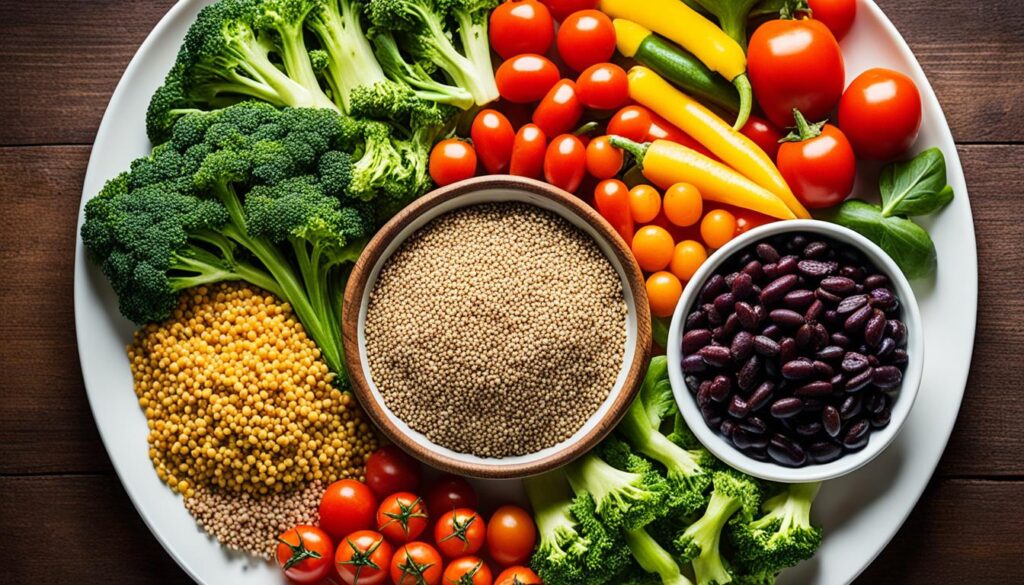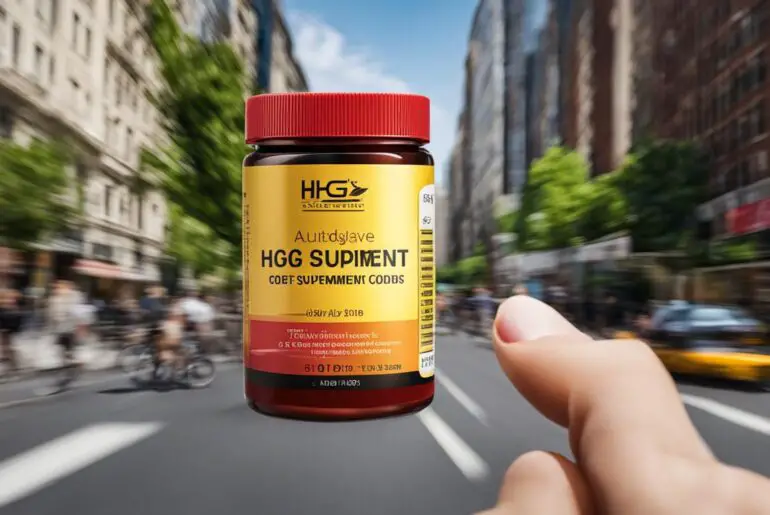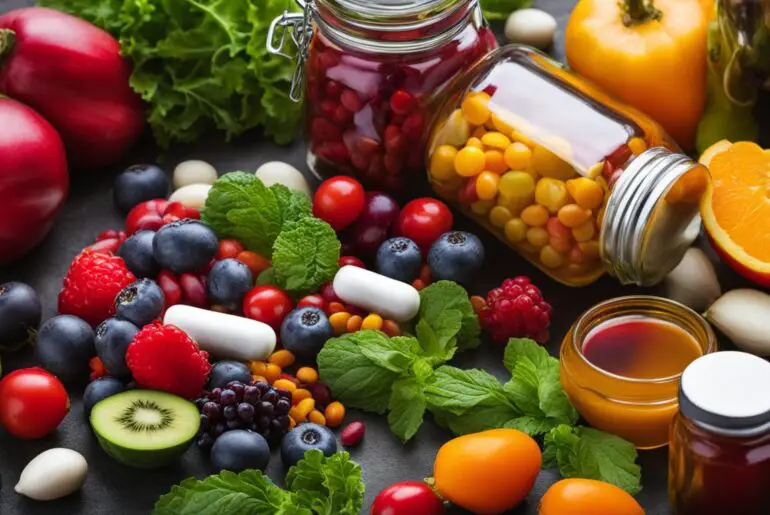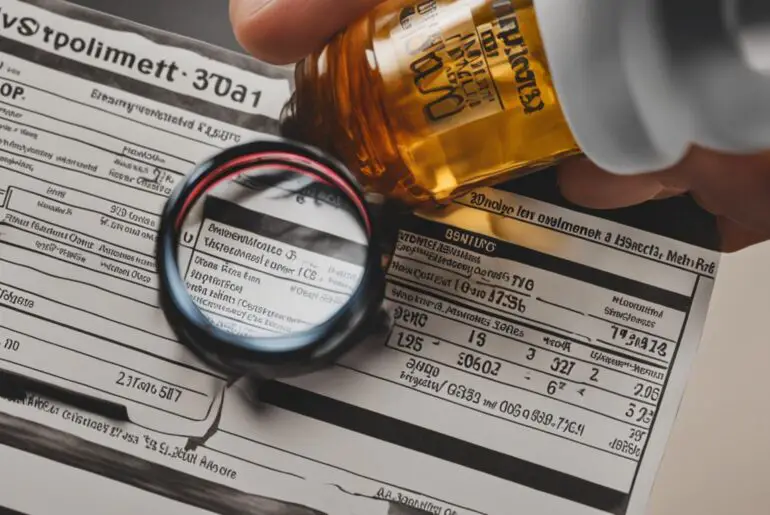Did you know that the HCG diet is touted as one of the fastest ways to shed pounds? With its promise of rapid weight loss, it has gained popularity among those seeking quick results. But before you jump on the HCG bandwagon, it’s important to understand the facts and considerations surrounding this controversial weight loss approach.
Key Takeaways:
- The FDA warns against the use of HCG weight-loss products for shedding pounds.
- Very low-calorie diets, like the HCG diet, carry potential risks and may lead to various side effects.
- Scientific evidence does not support the role of HCG in significant weight loss.
- The HCG diet plan involves extreme calorie restriction and limited food choices.
- Safe and sustainable weight loss can be achieved through lifestyle changes and professional guidance.
FDA’s Warning on HCG Diet Products
The FDA has issued a warning to consumers regarding the use of HCG weight-loss products. These products, claiming to contain HCG and often accompanied by a very low-calorie diet, are not only illegal but also pose potential dangers to individuals. It is important to note that HCG is approved by the FDA as a prescription medication for fertility issues and not for weight loss.
Despite the marketing claims made by HCG diet products, the FDA has found no substantial evidence to support their effectiveness in achieving weight loss. Any weight loss experienced while using these products is likely a result of severe calorie restriction rather than the HCG itself. Engaging in such dangerous practices can have detrimental effects on overall health and well-being.
To ensure your safety and well-being, it is crucial to prioritize evidence-based and approved methods for weight loss. Consulting with a healthcare professional can provide you with personalized guidance and recommendations for achieving your weight loss goals in a safe and sustainable manner.
“The FDA has found no substantial evidence to support the claims made by HCG diet products, and any weight loss is likely due to severe calorie restriction rather than the HCG itself.”
Remember, your health should always be the top priority when considering any weight loss approach. Avoid falling victim to illegal and potentially harmful practices like the use of HCG diet products. Seek out safer alternatives endorsed by healthcare professionals and supported by scientific evidence.
Risks Associated with Illegal and Dangerous Practices
Engaging in illegal and dangerous weight loss practices, such as the use of HCG diet products, can lead to various health risks and complications. These may include:
- Strong>X Gallstone formation
- Strong>X Nutrient deficiencies
- Strong>X Blood clotting
It is crucial to prioritize your well-being and choose methods that are both safe and effective for achieving your weight loss goals.
Image:
| Risks of Illegal HCG Diet Products | Dangers |
|---|---|
| Illegal | Engaging in the use of HCG diet products is against FDA regulations. |
| Dangerous | These products can lead to severe health complications and risks. |
| Ineffective | The FDA has found no substantial evidence to support their claims. |
Risks of Very Low-Calorie Diets

Very low-calorie diets, such as those recommended on the HCG diet, are not only unhealthy but also potentially dangerous. These diets severely restrict calorie intake, often to as low as 500 calories per day, which can have detrimental effects on the body.
One of the major risks of very low-calorie diets is the formation of gallstones. When the body is not receiving enough calories and nutrients, the liver releases more cholesterol into the bile, which can lead to the formation of gallstones.
Electrolyte imbalances are also a concern with these types of diets. Electrolytes, such as sodium, potassium, and magnesium, play a crucial role in maintaining the body’s fluid balance and regulating heart rhythm. When calorie intake is severely restricted, electrolyte imbalances can occur, leading to dizziness, fatigue, and in severe cases, irregular heartbeat.
Following a very low-calorie diet without medical supervision can also result in nutrient deficiencies. These diets often lack essential vitamins, minerals, and macronutrients, such as protein. Inadequate protein intake can lead to muscle loss, weakened immune function, and slow metabolism.
Quote:
“It is crucial to prioritize safe and sustainable weight loss methods that provide adequate nutrition.”
It is important to note that while short-term weight loss may be achieved with very low-calorie diets, the long-term sustainability and potential health risks outweigh the benefits. Opting for a balanced, nutritious diet and incorporating regular physical activity is a safer and more effective approach to weight loss.
| Risk | Description |
|---|---|
| Gallstone Formation | Severe calorie restriction can lead to the increased release of cholesterol in the bile, resulting in the formation of gallstones. |
| Electrolyte Imbalance | Very low-calorie diets can disrupt the balance of electrolytes in the body, leading to dizziness, fatigue, and irregular heartbeat. |
| Nutrient Deficiencies | These diets often lack essential nutrients, including protein, vitamins, and minerals, which can lead to muscle loss, weakened immune function, and a slow metabolism. |
Scientific Evidence on HCG and Weight Loss
Despite the claims made by proponents of the HCG diet, scientific evidence does not support the notion that HCG plays a significant role in weight loss. Numerous studies have consistently found that any weight loss achieved with the HCG diet is primarily due to the super-low-calorie intake rather than the HCG itself.
It is worth noting that the FDA has not approved HCG for weight loss and has not found any substantial evidence to support its role in increasing weight loss beyond what can be achieved through calorie restriction alone.
The available scientific evidence suggests that the super-low-calorie diet associated with the HCG protocol is responsible for the observed weight loss, rather than any unique effects of HCG supplementation.
The Science Behind HCG and Weight Loss
Multiple studies have compared the effects of the HCG diet with a similarly restrictive low-calorie diet without HCG supplementation. These studies consistently found that both groups experienced similar weight loss outcomes.
For example, one randomized controlled trial published in the American Journal of Clinical Nutrition compared the effects of a super-low-calorie diet with and without HCG supplementation. The study concluded that there was no significant difference in weight loss between the two groups, indicating that HCG did not provide any additional benefits beyond calorie restriction alone.
Another larger study published in the Journal of the American Medical Association (JAMA) reached similar conclusions. The study involved 202 participants assigned to receive either HCG injections or a placebo. Both groups followed a super-low-calorie diet. The researchers found no significant difference in weight loss between the two groups, reinforcing the notion that it is the severe calorie restriction that leads to weight loss, not the HCG supplementation.
Scientific evidence consistently indicates that it is the super-low-calorie diet, rather than HCG supplementation, that is responsible for weight loss associated with the HCG diet.
Overview of the HCG Diet Plan
The HCG diet plan is a weight loss approach that involves strict calorie restriction and the use of HCG supplements. The diet typically restricts calorie intake to around 500 per day for a period of 8 weeks. This very low-calorie diet is accompanied by taking HCG supplements, which can be in the form of drops, injections, or tablets.
On the HCG diet, meals are limited to two per day and must include specific food groups. Each meal should consist of a protein source, a vegetable, a bread option, and a fruit. The diet allows for specific choices within each food group. Here is an overview of the allowed foods on the HCG diet:
- Protein Sources: Lean meats such as chicken breast, lean beef, fish, and shrimp.
- Vegetables: A variety of non-starchy vegetables like spinach, lettuce, cucumbers, tomatoes, and cabbage.
- Bread Options: Breadsticks or melba toast.
- Fruits: Apples, strawberries, oranges, and grapefruit.
These allowed foods provide the necessary macronutrients and variety within the limited calorie intake. However, it is important to note that this level of calorie restriction is highly restrictive and may not provide adequate nutrition for long-term health.
Table: Overview of Allowed Foods on the HCG Diet
| Food Group | Options |
|---|---|
| Protein Sources | Lean meats like chicken breast, lean beef, fish, shrimp |
| Vegetables | Spinach, lettuce, cucumbers, tomatoes, cabbage |
| Bread Options | Breadsticks or melba toast |
| Fruits | Apples, strawberries, oranges, grapefruit |
While the HCG diet plan offers a structured approach to weight loss, it is important to consult with a healthcare professional before embarking on such a restrictive diet. They can provide guidance on whether this plan aligns with your nutritional needs and help you develop a safe and effective weight loss strategy.
Considerations for Vegetarians and Vegans on the HCG Diet

While the HCG diet is claimed to be suitable for anyone, including vegetarians and vegans, it may pose challenges for these individuals. The diet heavily relies on animal protein sources, limiting options for those who follow plant-based diets.
As a vegetarian, you may find it difficult to obtain an adequate amount of protein from vegetarian sources while on the HCG diet. The creators of the diet suggest incorporating extra skim milk to compensate for the lack of protein from meat. However, it is important to note that this makes the diet unsuitable for vegans, as dairy consumption is not compatible with a vegan lifestyle.
It is crucial for individuals with dietary restrictions to carefully consider whether the HCG diet aligns with their nutritional needs and preferences. If you are a vegetarian or vegan, it may be beneficial to explore alternative weight loss approaches that provide sufficient protein from plant-based sources.
Plant-Based Protein Sources for Vegetarians and Vegans
If you are a vegetarian or vegan considering the HCG diet, here are some plant-based protein sources that you can incorporate into your meals:
- Legumes such as lentils, chickpeas, and black beans
- Quinoa
- Tofu and tempeh
- Nuts and seeds
- Whole grains like brown rice and oats
These plant-based protein sources can help support your nutritional needs while following a vegetarian or vegan diet. It is important to ensure that you are consuming a variety of these foods to obtain all essential amino acids.
Remember, consulting with a healthcare professional or registered dietitian is always recommended before starting any diet or weight loss plan. They can help provide personalized guidance and ensure that your dietary needs are being met.
Gluten-Free Options on the HCG Diet
The HCG diet does not specifically cater to individuals following a gluten-free diet. While certain food choices allowed on the diet, such as vegetables and some proteins, may inherently be gluten-free, the diet does not focus on gluten-free options. Individuals with gluten sensitivities or celiac disease should be cautious and ensure that they are not consuming any gluten-containing foods while on the HCG diet.
If you have a gluten intolerance or follow a gluten-free diet, it is essential to be aware of the potential sources of gluten in the HCG diet. This includes being mindful of ingredients in processed foods, condiments, and seasonings that may contain gluten.
Here are some gluten-free options that you can consider while following the HCG diet:
- Fresh vegetables: Enjoy a variety of gluten-free vegetables like spinach, lettuce, broccoli, cucumber, and bell peppers.
- Lean proteins: Stick to gluten-free protein sources such as chicken breast, turkey, fish, shrimp, or lean beef.
- Fruits: Incorporate gluten-free fruits like apples, strawberries, oranges, and grapefruits into your HCG diet.
- Brown rice: If you need a gluten-free grain option, you can replace the breadstick or melba toast with a small serving of cooked, gluten-free brown rice.
Remember to read food labels carefully and choose gluten-free options whenever possible. It’s always best to consult with a healthcare professional or a registered dietitian who can provide personalized guidance on a gluten-free HCG diet plan.
Gluten-Free HCG Diet Sample Meal Plan
| Meal | Food Choices |
|---|---|
| Breakfast | Grilled chicken breast with steamed broccoli |
| Lunch | Grilled fish with mixed greens salad (dressing: olive oil and lemon juice) |
| Snack | Apple slices |
| Dinner | Lean beef stir-fry with bell peppers and onions |
| Snack | Orange |
By being mindful and making informed choices, you can adhere to a gluten-free HCG diet and still achieve your weight loss goals while avoiding gluten-related discomfort or health issues.
Importance of Safe and Gradual Weight Loss
When it comes to weight loss, it’s crucial to prioritize safe and gradual methods rather than resorting to potentially risky and unsustainable diets like the HCG diet. While rapid weight loss may seem tempting, it can pose various health complications and nutrient deficiencies.
Instead, consider consulting with a healthcare professional who can provide personalized guidance and supervision for safe and effective weight loss. A health care professional can help design a balanced nutrition plan that meets your individual needs while ensuring adequate nutrient intake. Additionally, they can assist in creating an exercise routine that supports your weight loss goals.
Working with a health care professional ensures that you receive evidence-based advice tailored to your specific circumstances. They can monitor your progress, make necessary adjustments, and provide ongoing support throughout your weight loss journey.
Benefits of Safe and Gradual Weight Loss
Opting for safe and gradual weight loss methods offers numerous benefits for your overall health and well-being:
- Better Long-Term Results: Rapid weight loss often leads to weight regain. By focusing on safe and gradual weight loss, you increase your chances of maintaining your weight loss in the long run.
- Sustainable Lifestyle Changes: Safe weight loss encourages the adoption of healthy lifestyle habits that are more likely to be maintained over time, promoting the sustainability of your results.
- Reduced Risk of Nutrient Deficiencies: Gradual weight loss allows for a balanced approach to nutrition, ensuring you receive all the essential nutrients your body needs to function optimally.
- Improved Overall Health: Safe weight loss improves various aspects of your health, including cardiovascular health, blood sugar control, and overall well-being.
Remember, weight loss should not be pursued at the expense of your health. Prioritizing safe and gradual weight loss, with the guidance of a health care professional, sets the foundation for long-lasting success in achieving and maintaining a healthy weight.
“Safety should always be the number one priority when embarking on a weight loss journey. Gradual weight loss not only leads to better long-term results but also promotes sustainable lifestyle changes and improved overall health.”
Incorporating Lifestyle Changes for Weight Loss

Achieving long-term weight loss and maintaining a healthy weight requires more than just following a restrictive diet like the HCG diet. It is crucial to make sustainable lifestyle changes, including adopting a balanced diet and engaging in regular physical activity. These changes promote overall health and well-being while supporting gradual and sustainable weight loss.
To achieve permanent weight loss, it is essential to focus on a balanced diet that provides adequate nutrition. Aim to include a variety of fruits, vegetables, whole grains, lean proteins, and healthy fats in your daily meals. Avoid restrictive diets that eliminate entire food groups as they may lead to nutrient deficiencies and sabotage your weight loss efforts.
Regular exercise is also key to achieving and maintaining weight loss. Incorporate both cardiovascular exercises, such as brisk walking, jogging, or cycling, and strength training workouts into your routine. Cardio workouts help burn calories and improve heart health, while strength training builds muscle mass, increasing your metabolism even at rest.
“By making lifestyle changes and adopting a balanced diet and regular exercise, you can achieve permanent weight loss.”
“The key to successful weight loss is not just a temporary fix, but a long-term commitment to a healthier lifestyle.”
Consulting with a healthcare provider or a registered dietitian can provide valuable guidance and support on your weight loss journey. They can help develop a personalized plan based on your unique needs, preferences, and goals. They can also offer valuable advice on portion control, meal planning, and overcoming common obstacles that may hinder your progress.
Benefits of Lifestyle Changes for Weight Loss
Making sustainable lifestyle changes offers numerous benefits beyond weight loss itself:
- Improved overall health and well-being
- Reduced risk of chronic diseases, such as diabetes, heart disease, and certain types of cancer
- Increased energy levels and improved mood
- Better sleep quality
- Enhanced physical performance and endurance
Embracing a balanced diet and regular exercise not only helps you shed pounds, but it also sets the foundation for a healthier and more fulfilling life.
| Benefits of Lifestyle Changes for Weight Loss | Methods to Incorporate |
|---|---|
| Improved overall health and well-being | Adopting a balanced diet and engaging in regular exercise |
| Reduced risk of chronic diseases | Making sustainable lifestyle changes |
| Increased energy levels and improved mood | Consulting with healthcare providers or registered dietitians |
| Better sleep quality | Planning portion control and meals |
| Enhanced physical performance and endurance | Overcoming common obstacles |
Conclusion
After careful consideration of the available evidence and potential risks, it is clear that the HCG diet is not a safe or effective approach to weight loss. While it may promise rapid results, the lack of scientific evidence to support its claims and the potential dangers associated with severe calorie restriction and the use of HCG supplements cannot be ignored.
Instead, it is advisable to focus on safer and more sustainable alternatives for weight loss. One of the key factors in achieving successful long-term weight loss is adopting a balanced diet that provides all the necessary nutrients, coupled with regular exercise. Consulting with a healthcare professional or registered dietitian can help tailor an individualized plan that takes into consideration specific needs and goals.
Weight loss should not come at the expense of your health and well-being. Prioritizing safety and long-term success requires a holistic approach that promotes overall health and sustainable lifestyle changes. By making informed choices and seeking evidence-based guidance, you can embark on a weight loss journey that not only helps you shed unwanted pounds but also supports your overall health and well-being.
FAQ
Are HCG diet supplements effective for weight loss?
The safety and effectiveness of HCG diet supplements have been called into question by the FDA. HCG is not approved for over-the-counter use and has not been proven to work for weight loss. Severe calorie restriction, rather than the HCG supplements themselves, is likely responsible for any weight loss.
What risks are associated with the HCG diet?
The HCG diet poses potential risks such as gallstone formation, nutrient deficiencies, and blood clotting. Very low-calorie diets, like the HCG diet, are unhealthy and may lead to side effects such as electrolyte imbalances and irregular heartbeat.
Is there scientific evidence supporting the effectiveness of the HCG diet?
Most studies have found that any weight loss achieved with the HCG diet is primarily due to the extremely low-calorie intake rather than the HCG itself. The FDA has not approved HCG for weight loss or found any substantial evidence to support its role in increasing weight loss beyond that achieved through calorie restriction.
What does the HCG diet plan entail?
The HCG diet plan involves restricting calorie intake to around 500 per day for 8 weeks, accompanied by the use of HCG supplements. Meals are limited to two per day and must include a protein source, a vegetable, a bread, and a fruit. However, this level of calorie restriction is highly restrictive and may not provide adequate nutrition.
Is the HCG diet suitable for vegetarians and vegans?
The HCG diet heavily relies on animal protein sources, making it challenging for vegetarians and unsuitable for vegans. The diet suggests adding extra skim milk for vegetarians to compensate for the lack of meat protein but is not compatible with vegan diets.
What gluten-free options are available on the HCG diet?
While certain food choices allowed on the HCG diet, such as vegetables and some proteins, may inherently be gluten-free, the diet does not focus on gluten-free options. Individuals with gluten sensitivities or celiac disease should be cautious and ensure they are not consuming any gluten-containing foods while on the HCG diet.
Is it better to prioritize safe and gradual weight loss methods?
Yes, it is important to prioritize safe and gradual weight loss methods rather than resorting to potentially risky and unsustainable diets like the HCG diet. Rapid weight loss through extreme calorie restriction can lead to various health complications and nutrient deficiencies. Consulting with a healthcare professional is recommended.
What lifestyle changes should I incorporate for weight loss?
Achieving long-term weight loss and maintaining a healthy weight requires more than just following a restrictive diet like the HCG diet. It is crucial to make sustainable lifestyle changes including adopting a balanced diet and engaging in regular physical activity. Consulting with a healthcare provider or registered dietitian can help develop a personalized plan for lasting results.
Is there a safer alternative to the HCG diet for weight loss?
Instead of the HCG diet, it is recommended to consider safer alternatives that prioritize health and well-being. Consult with a healthcare professional who can provide personalized guidance and supervision for safe and effective weight loss, focusing on balanced nutrition and regular physical activity.




